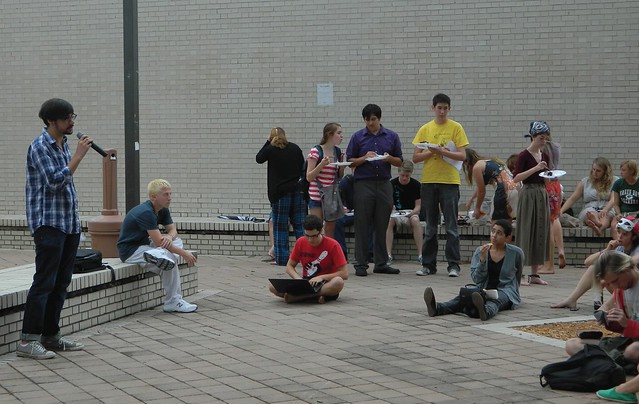
At the first Towne Meeting of the school year, held on Sept. 18, a motion codifying and modifying the electoral code for the New College Student Alliance (NCSA) positions passed with overwhelming support. Presented by second-year and NCSA Supervisor of Elections McAlister Grant, the motion carried five sub-motions, four of which passed at the meeting as well. The four sub-motions clarified election procedures and included new aspects that would allow candidates and voters greater access to information regarding NCSA positions.
“There have consistently been concerns that people don’t know what they’re voting on and candidates don’t know what they’re voting for,” Grant said. “The information is not readily available in the Great Book.”
He also expressed frustration with candidates having to individually come to him with questions about their exact positions.
“I have to hunt around for that information,” Grant said. “It should be available to the entire student body.”
First-year Paige Pellaton, who won the position of First Year Representative in the Student Allocations Committee (SAC), expressed appreciation for Grant’s election code changes, particularly sub-motion two.
“I’m so glad that it passed,” Pellaton said. “As a first year… you’re kind of going blind [into elections]. There’s not a lot of upperclassmen that you know well enough to talk to, to ask about positions.”
Pellaton also said that although she tried to do research on the position she ran for, it was mostly fruitless.
“I read through the Great Book and the election codes … but they didn’t really specify what each individual member’s responsibilities were,” Pellaton said. “I ended up talking to Cassie Corrado, who was my orientation leader … If I didn’t have Cassie, I may not have run.”
Although there do exist “hold-over documents,” which previous members of office are supposed to pass down to new members, most NCSA members did not receive any, including Pellaton. As a result, even after she was elected, Pellaton did not receive any information regarding her office until the first SAC meeting.
“I didn’t even know we were connected to the CSA,” Pellaton said.
Thesis student Blair Sapp, who is co-Speaker of the Towne Meeting, expressed appreciation for Grant’s proposals.
“The NCSA has been structured in an inherently confusing and counter
intuitive way while also not doing a proper job educating students on the process,” Sapp wrote in an email. “[Grant’s] proposed change … were trying to clarify a longstanding problem where students run for an office without knowing the expectations that position brings with it.”
Sapp said that information about candidates has previously not been readily available to students, hindering candidates’ abilities to differentiate themselves.
“With these changes … I hope students can better hold their elected officials accountable,” Sapp said.
According to Grant, multiple students had approached him interested in a process to meet the candidates.
“A lot of people told me that in past years when people had done candidate forum events, the turnout wasn’t good, people didn’t really care, and it was impossible to get people to show up to events without pizza. But when I held one, turn-out was actually really good,” Grant said, indicating that there is far greater demand to meet and know the candidates than the current election process allows for or requires.
Although Grant said some
students have expressed concern regarding the more stringent requirements – worried they may deter some candidates from running – he does not believe that the new changes will negatively affect the amount of students running for candidacy.
“I think people like to be involved when they feel like their time is important… [and] like they feel like they’re actually doing something that matters. I think part of why we struggled to fill some positions is because of the lack of information.” Grant also added, “we should not want the type of candidates who are deterred from seeking office by standards that require them to do work in that office.”
Each of the four sub-motions addressed a different point of order in clarifying electoral procedure. Sub-motion one, which was co-written by fourth-year Arianna Ruolo, called for a candidate information guide to be provided at the polling station. The guide will detail the positions being voted on and a platform statement from each of the candidates running. Sub-motion two mandated all NCSA heads to create a “duties and expectations” documents for each position, which every candidate would have to sign and turn in along with their petitions for candidacy. Sub-motion three rescheduled the late-fall election’s petitioning period to the week after Halloween, so that elections do not conflict with Halloween PCP. Sub-motion five officially added the second Green Affairs Representative to the great book for elections, where it had previously not been addressed. Sub-motion four, which did not pass, would have codified limitations on campaigning on the Forum.
Ruolo, who initially created the concept of what would become sub-motion one in response to a Forum discussion about the lack of information available to students, appreciated the passing of the motion.
“I’m glad I had the opportunity to make a difference in school’s codes,” Ruolo said. “Changing little things like that feels like a tiny legacy or mark to leave behind after I graduate.”
